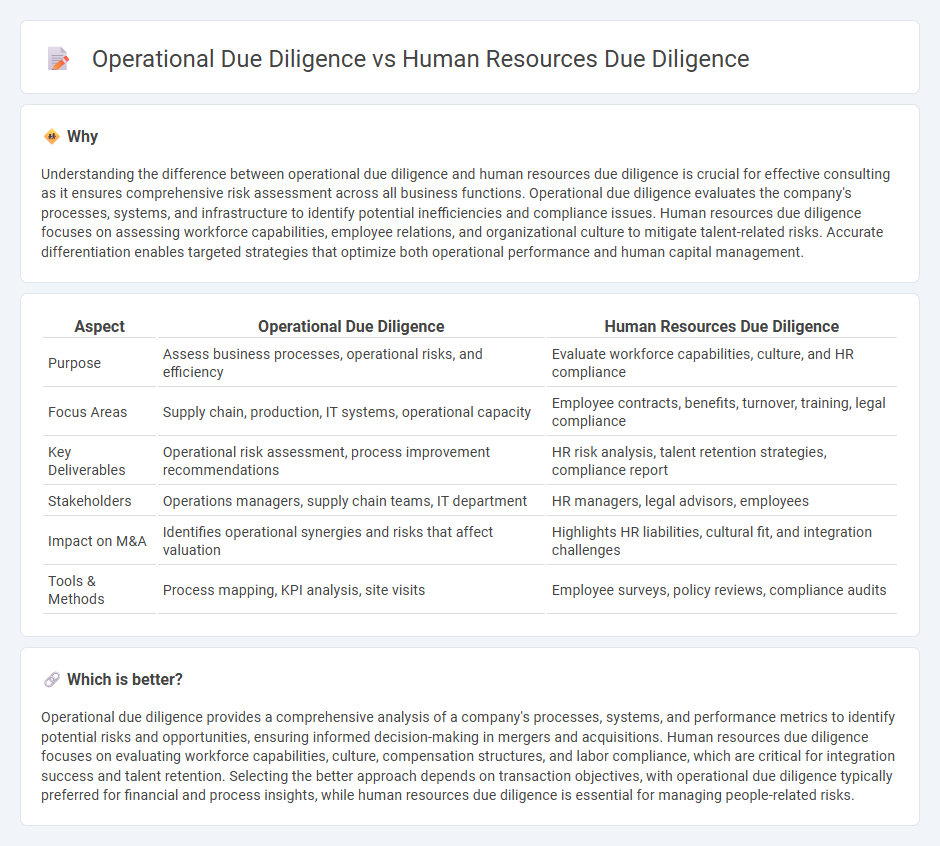
Operational due diligence involves evaluating a company's processes, systems, and performance metrics to identify risks and growth opportunities, ensuring efficient business operations. Human resources due diligence focuses on assessing workforce capabilities, organizational culture, compliance with labor laws, and employee relations to safeguard talent integration and mitigate HR-related risks. Explore more to understand how these assessments support strategic business decisions.
Why it is important
Understanding the difference between operational due diligence and human resources due diligence is crucial for effective consulting as it ensures comprehensive risk assessment across all business functions. Operational due diligence evaluates the company's processes, systems, and infrastructure to identify potential inefficiencies and compliance issues. Human resources due diligence focuses on assessing workforce capabilities, employee relations, and organizational culture to mitigate talent-related risks. Accurate differentiation enables targeted strategies that optimize both operational performance and human capital management.
Comparison Table
| Aspect | Operational Due Diligence | Human Resources Due Diligence |
|---|---|---|
| Purpose | Assess business processes, operational risks, and efficiency | Evaluate workforce capabilities, culture, and HR compliance |
| Focus Areas | Supply chain, production, IT systems, operational capacity | Employee contracts, benefits, turnover, training, legal compliance |
| Key Deliverables | Operational risk assessment, process improvement recommendations | HR risk analysis, talent retention strategies, compliance report |
| Stakeholders | Operations managers, supply chain teams, IT department | HR managers, legal advisors, employees |
| Impact on M&A | Identifies operational synergies and risks that affect valuation | Highlights HR liabilities, cultural fit, and integration challenges |
| Tools & Methods | Process mapping, KPI analysis, site visits | Employee surveys, policy reviews, compliance audits |
Which is better?
Operational due diligence provides a comprehensive analysis of a company's processes, systems, and performance metrics to identify potential risks and opportunities, ensuring informed decision-making in mergers and acquisitions. Human resources due diligence focuses on evaluating workforce capabilities, culture, compensation structures, and labor compliance, which are critical for integration success and talent retention. Selecting the better approach depends on transaction objectives, with operational due diligence typically preferred for financial and process insights, while human resources due diligence is essential for managing people-related risks.
Connection
Operational due diligence evaluates a company's processes, systems, and performance to identify risks and opportunities, directly impacting human resources due diligence by assessing staff capabilities, organizational structure, and talent management. Human resources due diligence examines workforce competency, turnover rates, and cultural fit, which are critical to operational efficiency and sustainability documented in operational due diligence. Effective integration of both ensures a comprehensive understanding of operational risks linked to human capital, enabling informed investment and management decisions.
Key Terms
Talent Assessment (Human Resources Due Diligence)
Talent assessment in human resources due diligence centers on evaluating workforce capabilities, organizational culture, retention risks, and leadership effectiveness to ensure alignment with strategic goals. Operational due diligence, while broader, incorporates assessment of talent but primarily focuses on operational processes, systems, and performance metrics. Discover how targeted talent evaluation can drive successful mergers and acquisitions by diving deeper into human resources due diligence.
Process Efficiency (Operational Due Diligence)
Operational due diligence focuses on evaluating process efficiency by analyzing workflow optimization, resource allocation, and technology integration within an organization's operations. Human resources due diligence, in contrast, concentrates on assessing workforce capabilities, talent management, and compliance with labor regulations. Explore further to understand how these due diligence types impact business performance and decision-making.
Compliance (Human Resources Due Diligence)
Human Resources Due Diligence centers on evaluating compliance with labor laws, employment contracts, benefits administration, workplace safety, and employee relations to mitigate legal risks and ensure regulatory adherence. Operational Due Diligence, while examining overall business functions, focuses more broadly on processes, systems, and management effectiveness rather than specific HR compliance issues. Explore more to understand how thorough HR due diligence strengthens organizational compliance frameworks.
Source and External Links
How to Efficiently Conduct HR Due Diligence -- Provides a comprehensive checklist covering current staff overview, HR policy review, legal/compliance issues, and HR benefits to thoroughly assess a target company's human capital during mergers or acquisitions.
2025 HR Due Diligence Checklist & Guide for HR Leaders -- Outlines the systematic review of human capital, culture, compensation, compliance, and policy to uncover risks, liabilities, and value creation opportunities critical for merger/acquisition decisions.
The human side of due diligence -- Focuses on analyzing people-related liabilities, value drivers, and organizational structure to assess risks, opportunities, and the ability to attract and retain talent throughout the deal lifecycle.
 dowidth.com
dowidth.com